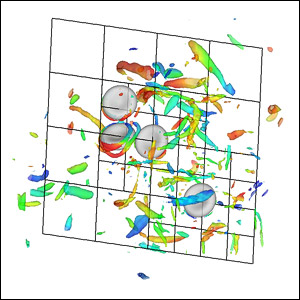
|
 |
A model showing a cluster of red blood cells (round, gray) interacting with homogeneous decaying turbulence. |
|
Fischell Department of Bioengineering associate professor Elias Balaras is the project leader of a multidisciplinary team that has been awarded a four-year, $1.5 million National Science Foundation (NSF) grant for a project titled "Petascale Algorithms for Multi-Body, Fluid-Structure Interactions in Viscous Incompressible Flows." Balaras' co-PIs on the project are Professor Joseph JaJa (Department of Electrical and Computer Engineering/UMIACS), Assistant Professor Santiago Solares (Department of Mechanical Engineering), and Senior Computational Scientist Anshu Dubey (ASC/Flash center, University of Chicago).
The objective of the project is to develop high-performance computing tools that can be used to accurately model complex fluid/structure interaction problems that occur in a variety of natural and engineered systems. The complexity of these flows and interactions are, according to Balaras, "among the most challenging problems in computational mechanics." His team is particularly focused on problems found in human cardiovascular circulation and related biomedical devices. Successful simulations will enable new research on the progression of serious and potentially fatal conditions such as hemolysis (the premature breakdown of red blood cells) and thrombosis (blood clots). What is learned about these conditions could have an impact on the future development of the biomedical devices used to treat atherosclerosis, heart valve disease, and other disorders.
Crucial to the project is the use of high-performance computing (HPC) systems capable of handling the massive amount of information representing the millions of deformable blood cells traveling through and interacting with the human circulatory system. According Balaras, by 2011, researchers should have access to systems capable of speeds in excess of one petaflop?a thousand trillion floating point operations?per second. Taking advantage of this level of computing power in the group's research, however, presents its own challenges: "These systems are expected to consist of tens of thousands to a few hundred thousand processors, with each processor containing multiple cores, [and] each core capable of executing multiple threads," Balaras explains. "These features present computational scientists with many challenges, including discovering and exploiting parallelism within algorithms and codes and overlapping different types of operations." The team will need to design their tools to work specifically at the petaflop computing scale.
?We are a multidisciplinary team with expertise in computational science, parallel computing and multiscale physics and modeling,? says Balaras. ?We are all very excited about the prospect of developing computational models of unprecedented complexity and size that will have a significant impact on human health care."
The project will also include training and research opportunities for high school and undergraduate research assistants, as well as summer outreach internships.
For More Information
View the NSF award abstract »
Visit Dr. Balaras' web site »
Related Articles:
NSF grant will further planning for collaborative autonomy testing infrastructure
Gabriel spending academic year in two visiting professorships
With MIPS funding, Herrmann and Azarm developing algorithm for ice forecasting app
Gabriel, Brubaker developing game theory water market models for river users
Herrmann helping UMMS design and refine vaccination clinics
UMD developing COVID-19 decision making tools for colleges
New model can help decisionmakers planning to retrofit buildings for energy efficiency
Public health planners: Free resources for emergency health clinics
Steven Gabriel participates in two international academic events
Ph.D. student Kevin Lister wins Link Foundation Fellowship
September 25, 2009
|

